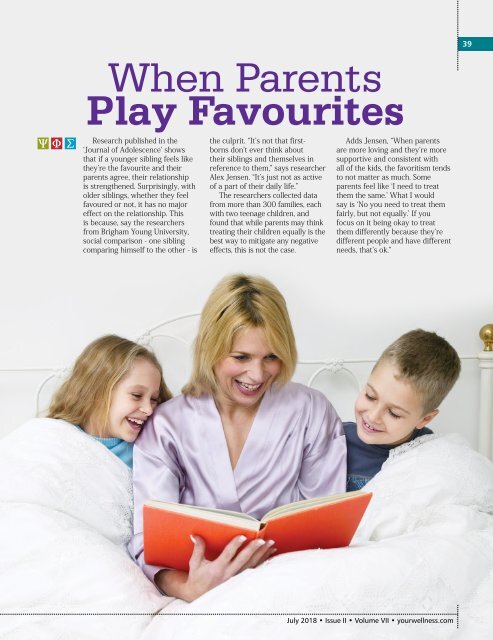YW_Issue_94_July-18_68 pages
Create successful ePaper yourself
Turn your PDF publications into a flip-book with our unique Google optimized e-Paper software.
39<br />
When Parents<br />
Play Favourites<br />
Research published in the<br />
‘Journal of Adolescence’ shows<br />
that if a younger sibling feels like<br />
they’re the favourite and their<br />
parents agree, their relationship<br />
is strengthened. Surprisingly, with<br />
older siblings, whether they feel<br />
favoured or not, it has no major<br />
effect on the relationship. This<br />
is because, say the researchers<br />
from Brigham Young University,<br />
social comparison - one sibling<br />
comparing himself to the other - is<br />
the culprit. “It’s not that firstborns<br />
don’t ever think about<br />
their siblings and themselves in<br />
reference to them,” says researcher<br />
Alex Jensen. “It’s just not as active<br />
of a part of their daily life.”<br />
The researchers collected data<br />
from more than 300 families, each<br />
with two teenage children, and<br />
found that while parents may think<br />
treating their children equally is the<br />
best way to mitigate any negative<br />
effects, this is not the case.<br />
Adds Jensen, “When parents<br />
are more loving and they’re more<br />
supportive and consistent with<br />
all of the kids, the favoritism tends<br />
to not matter as much. Some<br />
parents feel like ‘I need to treat<br />
them the same.’ What I would<br />
say is ‘No you need to treat them<br />
fairly, but not equally.’ If you<br />
focus on it being okay to treat<br />
them differently because they’re<br />
different people and have different<br />
needs, that’s ok.”<br />
<strong>July</strong> 20<strong>18</strong> • <strong>Issue</strong> II • Volume VII • yourwellness.com




